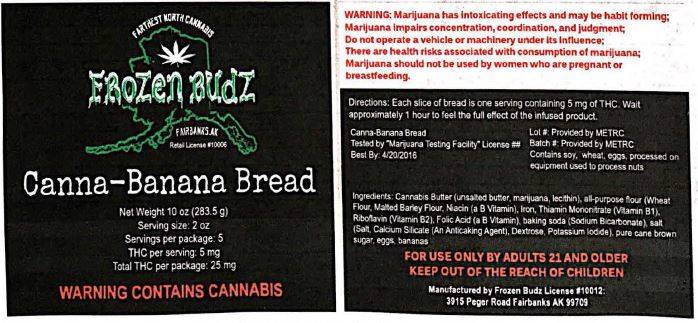Alaska’s one-year-old recreational marijuana industry faces a major test Friday morning as members of the Alaska Marijuana Control Board consider whether to revoke the license of a manufacturer accused of selling untested, contaminated marijuana edibles.
The board meets at 8 a.m. Friday by phone to consider the case of Fairbanks-based Frozen Budz, which has been accused of selling almost 115,000 marijuana edibles that may have been contaminated by mold or were far stronger than allowed by state regulation.
The Alaska Alcohol and Marijuana Control Office has already ordered retailers to stop selling all Frozen Budz products, and the board could shutter the business entirely. Frozen Budz is either the largest or second-largest manufacturer of edible marijuana products in Alaska.
“It feels like it could be a very bad shadow over the industry if they’re found guilty,” said Lacy Wilcox, a board member of the Alaska Marijuana Industry Association, a trade group. “That would be pretty awful.”
Frozen Budz, owned by Destiny Neade and Nick Neade of Fairbanks, was the first company in Alaska to receive a retail marijuana license. The company was also one of the first to be licensed to produce marijuana products, such as marijuana-infused cookies, muffins and bread.
Destiny Neade told the Associated Press in 2016 that she and her husband had poured more than $150,000 into their business, which they envisioned as a “home-feel bakery but infused with marijuana.”
The Empire attempted to contact the Neades by email and by phone calls to their cellphones, as well as their business number, but neither responded. A Frozen Budz worker who answered the phone Thursday said they were busy, then in a separate call, said they were out of the office and not expected back.
THC, the principal psychoactive component in marijuana, is fat-soluble. Bakers typically infuse butter or oil with THC extracted from marijuana. State regulations require this butter or oil to be tested for potency. They also require the final product — bread, muffin or cookie — to be tested as well.
According to AMCO records, only five of 76 batches of oil and butter created by Frozen Budz were tested as required. In 48 of the batches, neither the oil/butter nor the resulting product were tested.
After a complaint, AMCO found that the state’s required seed-to-sale tracking system didn’t contain entries for many of Frozen Budz’ products.
Erika McConnell, director of AMCO, said by phone that the purpose of that system is to ensure that the state can track the flow of marijuana. The state should be able to follow a marijuana plant through the extraction process to the brownie that results. In tens of thousands of cases, it couldn’t.
“They could be sloppy in their record-keeping, or they could be bringing in black-market marijuana. We just don’t know at this point,” McConnell said.
AMCO bought three packages of “CannaBanana Bread” muffins produced by Frozen Budz from retailers in Anchorage and submitted them to a pair of testing labs.
State regulations limit edibles to 5 milligrams of THC per serving. The muffins tested by AMCO were all above that limit. The least-potent muffin had 9.61 milligrams. The most-potent muffin had 16.08 milligrams, more than three times the legal limit.
One lab also found the muffins were contaminated by microbes; the second lab noted that its muffins were moldy.
In the wake of those tests, AMCO temporarily suspended Frozen Budz’ license. The Neades requested a hearing from the marijuana board, whose members confirmed the suspension. McConnell has since recommended that the Neades’ license be revoked for five years, something that could happen as soon as Friday morning.
The board will also consider accusations that the Neades improperly gave their employees marijuana products, smoked marijuana on site, improperly disposed of waste, and manufactured unapproved versions of their products.
Most of Frozen Budz’ products were sold in Southcentral and Interior Alaska. The only Juneau retailer to carry them was Fireweed Factory.
Fireweed Factory owner Paul Disdier said it’s difficult for him to imagine the Neades as doing something wrong.
“I just can’t imagine they would jeopardize their business,” he said. “I don’t think they’re the kind of people that would put out all that money or hard work and see it go to waste.”
Disdier said he visited their Fairbanks facility and found it clean. He said he’s never heard of any problems with their products, which are popular with customers.
He said if anything did go wrong, he expects it was an honest mistake.
Justin Roland is owner of Einstein Labs, which manufactures Starburst-style marijuana edible candy from Anchorage. He said it’s not hard to follow the state’s regulations, but the problem for manufacturers is that there are many interpretations of those regulations, and businesses are still working out which interpretation is correct.
“To tell you the truth, I think it’s growing pains,” he said.
Ben Wilcox, one of the figures behind THC Concentrates, which manufactures marijuana oil in Juneau, said he’s of two minds about the case.
“I really — as an industry person — I hope that it’s not true, but as an industry person, I hope that if they are doing something wrong, the state does something,” he said. “That’s what regulation means. If you’re not doing business right, you don’t get to do business anymore.”
Correction: This story has been updated to correct Lacy Wilcox’s title. She is married to a marijuana licensee but is not a licensee herself.
• Contact reporter James Brooks at james.k.brooks@juneauempire.com or call 523-2258.

